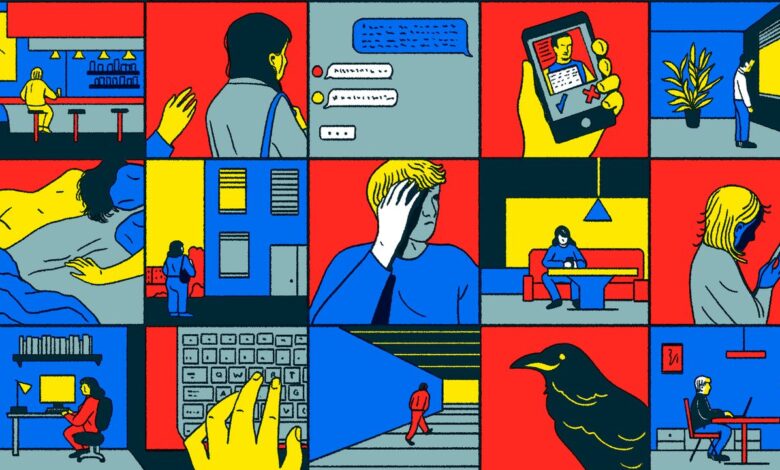“Rejection,” by Tony Tulathimutte, Reviewed: A Story Collection About People Who Just Can’t Hang

“The Feminist” was the most read piece of fiction in n+1’s history, and so some readers of “Rejection” will anticipate the way a couple of endings move past cringe into criminal. This is a break from the short-fiction tradition in which lonely, monstrous protagonists don’t do much. Kafka’s Gregor Samsa, tired of burdening his family with his big bug body, decides to simply expire. The title character of H. P. Lovecraft’s “The Outsider” looks at his reflection for the first time, sees a “compound of all that is unclean, uncanny, unwelcome, abnormal, and detestable,” and takes up drinking nepenthe for the duration. David Foster Wallace’s titular Depressed Person dwindles into existential nothingness, a speck of dust in the vacuum of her agonized solipsism. Tulathimutte chooses to activate his rejects. The “true rejection plot is the one the reject devises in the absence of a plot,” he wrote, in April, in The Paris Review. He’s interested in the way rejection prompts not just inward harm but outward violence. His plots are ultimately about the mistake of seeking revenge.
Tulathimutte, who’s forty-one, is one of the foremost fiction writers exploring the subject of his own generation. His characters are so recognizably, painfully millennial because their selfhood is so obviously mediated by the Internet; their instincts are inextricable from their upbringing in an online ecosystem that seizes every individual’s desires and vulnerabilities as fodder for profit and exploitation. In “Private Citizens,” his 2016 début novel, which featured a quartet of lonely and hyper-verbose Stanford graduates struggling to function, the Internet in question was the less-awful Internet of the early Obama era. In “Rejection,” the Internet is the Internet that produced January 6th. The characters in the book are sometimes radicalized politically by all the time they spend online, but, more saliently, the experience deranges their personalities, which grow around the scaffolding of social networks like poisonous vines.
Together, the stories in “Rejection” form a case study in the way that the Internet has both popularized structural language about power and also flattened all sense of proportion, meaning, and historicity. Being online can swiftly amplify a personal feeling of rejection into a world view, a convincing theory that the universe is conspiring to shit specifically on the micro-demographic of you. “Rejection” captures, with alarming fluency, the way that language built for social justice can be easily repurposed. Trained in the jargon of allyship, Craig gains a sophisticated way to convince himself that women have tricked men to become “complicit in our own oppression by pretending it’s not happening or it doesn’t matter.” Alison believes that she’s being progressive when she calls out her friend for having an “Asian child bride” fetish, just because he shows up to drinks with a cute Korean girl named Cece.
Tulathimutte, whose formidable intellect and deviant instincts crackle in nearly every line, has recognized the Internet as the extraordinary repository of character study and self-narration that it is. The language of self-presentation on screens provides constant comedic fodder in “Rejection”—as in real life, the truth about the person who’s typing is often found in the gulf between their life as they see it and the life that others observe. The fourth short story, which starts with “Waddap!” and is written entirely as a Reddit post, is about a nightmare optimization bro, a toxic-positivity dork who uses “10x” as a verb and who assures his audience that he’s made it a “top priority over the years to study modern social behaviors, pop culture, and slang every bit as seriously as I studied Marcus Aurelius and JavaScript.” He explains how he took a girl out for omakase and “helped her appreciate it AF. . . . Doesn’t mindfulness hit so different?” The book’s constant mimicry of disposable digital expression makes for a tonal high-wire act. Sometimes the effort gets too obvious—“Likeeee he’s fine but his pronouns are ho/hum,” one girl writes in a group text. Sometimes, however, it’s perfect, as when Tulathimutte characterizes dating-app messages from “handsome men over fifty” as being like “Hi Alison. Great style. -Mike.”
The characters in “Rejection” do not give and receive touch, and this is part of what draws them, obsessively, to the Internet. Kant, the protagonist of a story titled “Ahegao: Or, the Ballad of Sexual Repression,” is a nerdy Thai American guy afflicted with a “sexual constipation that finds its only release in the fantasy of boundless, monstrous subjugation.” Aroused only by extreme, hyper-specific porn, he suspects that he will never be able to realize his fantasies—that he’s attracted to the “very quality of their nonexistence.” The punch line is that, even in the Pornhub era, Kant’s sexual desires are genuinely, truly beyond the pale, involving images like a penis entering another penis via anal penetration, and protruding tip from tip “like a pig-in-a-blanket.” The fantasy that Kant presents in interminable detail, in the form of an OnlyFans request written as a three-act movie treatment and extended over e-mail after he maxes out the Web site’s character limit, provoked in me the same admiring horror I once felt while watching a thirty-minute YouTube video that imagined the heat death of the universe in time-lapse.
Source link




